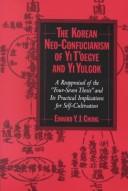| Listing 1 - 7 of 7 |
Sort by
|
Book
ISBN: 8976460774 Year: 2011 Publisher: 서울 예문서원
Abstract | Keywords | Export | Availability | Bookmark
 Loading...
Loading...Choose an application
- Reference Manager
- EndNote
- RefWorks (Direct export to RefWorks)
Book
Year: 1988 Publisher: Seoul : International T'oegyehak Society,
Abstract | Keywords | Export | Availability | Bookmark
 Loading...
Loading...Choose an application
- Reference Manager
- EndNote
- RefWorks (Direct export to RefWorks)
Book
ISBN: 0824868285 0824857488 Year: 2015 Publisher: Honolulu : University of Hawaii Press,
Abstract | Keywords | Export | Availability | Bookmark
 Loading...
Loading...Choose an application
- Reference Manager
- EndNote
- RefWorks (Direct export to RefWorks)
Yi Hwang (1501-1570)-best known by his literary name, T'oegye-is one of the most eminent thinkers in the history of East Asian philosophy and religion. His Chasŏngnok (Record of self-reflection) is a superb Korean Neo-Confucian text: an eloquent collection of twenty-two scholarly letters and four essays written to his close disciples and junior colleagues. These were carefully selected by T'oegye himself after self-reflecting (chasŏng) on his practice of personal cultivation. The Chasŏngnok continuously guided T'oegye and inspired others on the true Confucian way (including leading Neo-Confucians in Tokugawa Japan) while it criticized Buddhism and Daoism. Its philosophical merit rivals T'oegye's monumental Sŏnghak sipto (Ten diagrams on sage learning) and "Four-Seven Debate Letters"; however, as a testament of T'oegye's character, scholarship, and teaching, the Chasŏngnok is of greater interest. The work engages with his holistic knowledge and experience of self-cultivation by articulating textual and historical material on various key doctrines and ideas. It is an inspiring practical guide that reveals the depth of T'oegye's learning and spirituality.The present volume offers a fully annotated translation of the Chasŏngnok. Following a groundbreaking discussion of T'oegye's life and ideas according to the Chasŏngnok and his other major writings, it presents the core of his thought in six interrelated sections: "Philosophy of Principle," "Human Nature and Emotions," "Against Buddhism and Daoism," "True Learning," "Self-Cultivation," and "Reverence and Spiritual Cultivation." The bibliography offers a current catalogue of primary sources and modern works in Korean, Chinese, Japanese, and English. As the first comprehensive study of the Chasŏngnok, this book is a welcome addition to current literature on Korean classics and East Asian philosophy and religion. By presenting T'oegye's thought-provoking contributions, it sheds new light on the vitality of Confucian wisdom, thereby affording scholars and students with an excellent primary source for East Asian studies in general and Confucian studies in particular.
Philosophers --- Neo-Confucianism. --- Neo-Confucianism --- Yi, Hwang,
Book
ISBN: 3030779246 3030779238 Year: 2021 Publisher: Cham, Switzerland : Palgrave Macmillan,
Abstract | Keywords | Export | Availability | Bookmark
 Loading...
Loading...Choose an application
- Reference Manager
- EndNote
- RefWorks (Direct export to RefWorks)
Neo-Confucianism --- Neo-Confucianism. --- Yi, Hwang, --- Confucianism --- Philosophy, Chinese
Book
ISBN: 8976460820 Year: 1999 Publisher: 서울 예문서원
Abstract | Keywords | Export | Availability | Bookmark
 Loading...
Loading...Choose an application
- Reference Manager
- EndNote
- RefWorks (Direct export to RefWorks)
Philosophers --- Philosophy, Confucian --- Philosophy, Korean --- History --- Yi, I, --- Yi, Hwang
Book
ISBN: 9781786608604 178660860X 9781786608611 1786608618 Year: 2018 Publisher: London Rowman & Littlefield International
Abstract | Keywords | Export | Availability | Bookmark
 Loading...
Loading...Choose an application
- Reference Manager
- EndNote
- RefWorks (Direct export to RefWorks)
"This book explores Neo-Confucianism and its relationship to politics by examining the life and work of the two iconic figures of the Joseon dynasty Yi Hwang, (1501-1570, Toegye) and Yi I (1536-1584, Yulgok)"--
Political science --- Neo-Confucianism --- Philosophy --- History --- Political aspects --- Yi, Hwang, --- Yi, I, --- Political and social views.

ISBN: 0585090947 9780585090948 0791422755 0791422763 0791499111 9780791422755 9780791422762 9780791422762 Year: 1995 Publisher: Albany SUNY Press
Abstract | Keywords | Export | Availability | Bookmark
 Loading...
Loading...Choose an application
- Reference Manager
- EndNote
- RefWorks (Direct export to RefWorks)
This comparative study of Yi T'oegye (1501-1570) and Yi Yulgok (1536-1584), Korea's two most eminent Neo-Confucian thinkers, is a seminal work on the Four-Seven Debate, the most significant and controversial intellectual event in the Korean Confucian tradition. The Four-Seven thesis, a magnificent example of East Asian Confucian discourse at its best, remains each thinker's masterpiece, a compressed but integrated systemization of metaphysics, ethics, and spirituality. It addresses fascinating philosophical, moral, and psychological questions about the fundamental problem of feelings and emotions, as well as their implications for moral and spiritual self-transformation.This book is indispensable for those interested in Korean thought or intellectual history. It will enable specialists in Confucian studies to understand unique paradigms of Korean Neo-Confucianism. It will stimulate comparative philosophers or religionists and general humanists to consider Korean Neo-Confucianism seriously as a major resource for understanding East Asian philosophy and religion.
Four beginnings and seven feelings thesis. --- Neo-Confucianism --- Philosophy, Korean. --- Korean philosophy --- Four-seven thesis --- Yi, Hwang, --- Yi, I, --- Li, Er, --- Li, Ligu, --- Li, Shuxian, --- Ligu, --- Sŏktam, --- Ujae, --- Yi, Sŏk-tam, --- Yi, Sŏktam, --- Yi, Ujae, --- Yi, Yulgok, --- Yul-gok, --- Yulgok, --- 李珥, --- 李 珥, --- 이 이, --- 이이, --- Four beginnings and seven feelings thesis --- Philosophy, Korean --- K9030.50 --- K9032 --- K9040 --- K9125.50 --- Confucianism --- Philosophy, Chinese --- History --- Korea: Philosophy and thought -- history -- Chosŏn period (1392-1910) --- Korea: Philosophy and thought -- works by individual philosophers --- Korea: Philosophy and thought -- schools -- Confucianism --- Korea: Genealogy and biography -- biography -- Chosŏn period (1392-1910) --- Yi, Hwang --- Yi, Hwang, - 1501-1570 --- Yi, I, - 1536-1584
| Listing 1 - 7 of 7 |
Sort by
|

 Search
Search Feedback
Feedback About UniCat
About UniCat  Help
Help News
News